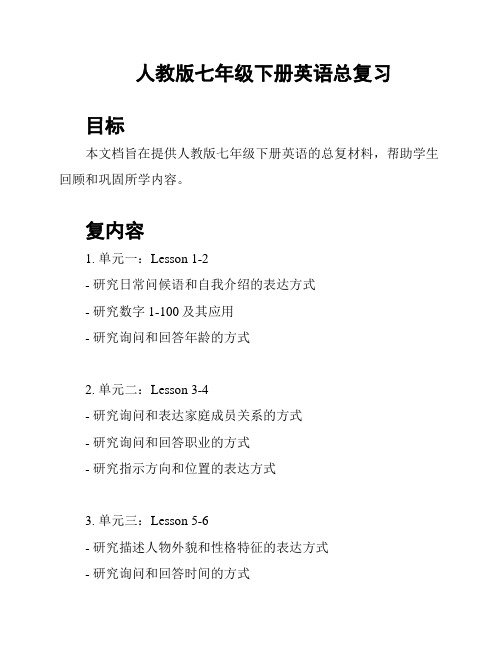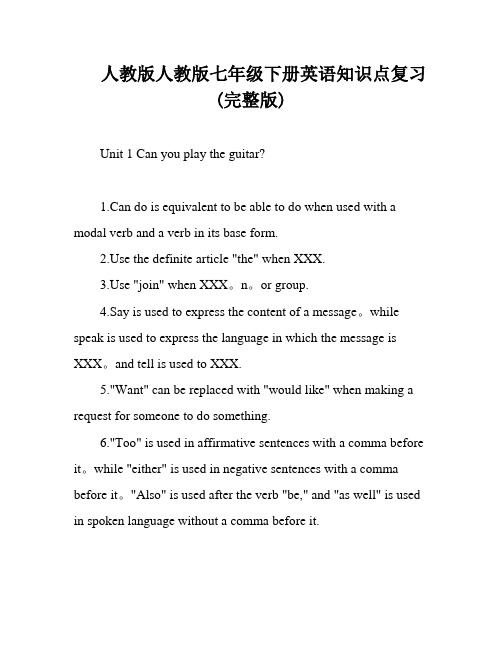人教版七年级英语下册总复习资料
- 格式:docx
- 大小:49.89 KB
- 文档页数:24

Unit1 Where’s your pen pal from?1. --你的笔友来自哪里(无“实义动词come, 用is/are”)--他来自加拿大。
-- your pen (有“实义动词come, 用do/does”)练:They’re _______ Australia, a beautiful country.A. come from D. for2. --(用法同上)--是的。
(用法同上)3. 他来自澳大利亚:他是澳大利亚人:4. --你的笔友住在哪里?--他住在多伦多。
练:-- When _____ the girl _____ her homework? -- In the evening.A. does, doesB. does, doC. is, doD. is, does-- _______ your sister have a pen pal? Yes, she _______.A. Is, isB. Does, doC. Can, canD. Does, does-- Ling Tao is a Chinese, but now he _______ in the UK.A. liveB. isC. is from5. --你的笔友说什么语言?--他说英语。
-- He/She speaks English.speak+语言;语言;语言;语言;say to sbtell sb练:My new pen pal ________ me that he can ________ Chinese but only a little.6. 我喜欢和我的伴侣一起去看电影:①②go to the movies③see a movie7. 写信给或人:互相写信:write e-mails to each other8.9.10.11.(1) 信:letter 一点:little(2) 法国:France 法语:12. (1) like v. 喜欢;如:(2) like prep. 像;如:13. (1) country n. 国家;如:(2) country n.14. (1) from perp. 来自;如:(2) from prep. 从;如:Unit2 Where’s the post office?1. 问路:(1) Excuse me, how can I get to the post office?2. --这儿附近有一个邮局吗?--是的。

人教版七年级下册英语总复习
目标
本文档旨在提供人教版七年级下册英语的总复材料,帮助学生回顾和巩固所学内容。
复内容
1. 单元一:Lesson 1-2
- 研究日常问候语和自我介绍的表达方式
- 研究数字1-100及其应用
- 研究询问和回答年龄的方式
2. 单元二:Lesson 3-4
- 研究询问和表达家庭成员关系的方式
- 研究询问和回答职业的方式
- 研究指示方向和位置的表达方式
3. 单元三:Lesson 5-6
- 研究描述人物外貌和性格特征的表达方式
- 研究询问和回答时间的方式
- 研究表示频率的副词及其应用
4. 单元四:Lesson 7-8
- 研究描述人物喜好和日常活动的表达方式- 研究询问和回答能力和兴趣的方式
- 研究表达原因和结果的连词及其应用
5. 单元五:Lesson 9-10
- 研究描述家庭、房间和城市的表达方式- 研究询问和表达地点的方式
- 研究表示数量和价格的词汇及其应用
6. 单元六:Lesson 11-12
- 研究询问和回答日程安排的方式
- 研究表达喜怒和感受的形容词及其应用- 研究询问和表达能力和意愿的方式
复建议
- 复每个单元的重点词汇和常用句型
- 做相关单元的练题和听力练
- 跟读课文,注意语音和语调的准确性
- 制作复笔记,总结重点内容和常见问题- 参加口语练和模拟对话
祝愿同学们复习顺利,考试取得好成绩!。

人教版七年级英语下册总复习知识点考点总结归纳人教版七年级英语下册知识点1. across from ……在……的对面 across from the bank 在银行的对面2. next to……紧靠…… next to the supermarket 紧靠超市3. between……and……在……和……之间between the park and the zoo 在公园和动物园之间among 表示位于三者或三者以上之间4. in front of……在……前面 There is a tree in front of the classroom. 课室前面有棵树。
in the front of……在……(内)的前部 There is a desk in the front of the classroom.课室内的前部有张桌子。
5. behind……在……后面 behind my house 在我家后面6. turn left/ right 向左/右拐on the left/right of……在某物的左/右边 on the left of our school 在我们学校的左边on one’s left/right 在某人的左/右边 on my left在我左边7. go straight 一直走8. down /along……沿着……(街道 down/along Center Street 沿着中央街9. in the neighborhood=near here 在附近10 welcome to……欢迎来到……11. take /have a walk 散步12. the beginning of…………的开始,前端at the beginning of……在……的开始,前端in the beginning 起初,一开始13. have fun=have a good time=enjoy oneself 玩得开心,过得愉快14. have a good trip 旅途愉快15. take a taxi 坐出租车16. 到达:get to +地方get here/ there/ home 到这/那/家 arrive in +大地方 I arrive in Beijing. arrive at +小地方I arrive at the bank. reach +地方17.go across 从物体表面横过 go across the street横过马路go through 从空间穿过 go through the forest穿过树林18.on + 街道的名称。

人教版人教版七年级下册英语知识点复习(完整版)Unit 1 Can you play the guitar?1.Can do is equivalent to be able to do when used with a modal verb and a verb in its base form.e the definite article "the" when XXX.e "join" when XXX。
n。
or group.4.Say is used to express the content of a message。
while speak is used to express the language in which the message is XXX。
and tell is used to XXX.5."Want" can be replaced with "would like" when making a request for someone to do something.6."Too" is used in affirmative sentences with a comma before it。
while "either" is used in negative sentences with a comma before it。
"Also" is used after the verb "be," and "as well" is used in spoken language without a comma before it.7."Be good at" is used to XXX or activity。

人教版七年级英语下册期末复习资料全册Unit1 Can you play the guitar?◆短语归纳1. play the guitar 弹吉他2. play chess 下棋3. spea English 说英语3. what to do sth 想做某事4. join the music club 加入音乐俱乐部5. match…..with 与……匹配6. the swimming club 游泳俱乐部7. what club 什么俱乐部8. a sports club 一个体育俱乐部10. be good at telling stories 擅长讲故事11. the story telling club 讲故事俱乐部12. lie to do/doing sth 喜欢做某事让我们加入......13. let’s join14. sound good 听起不错15. students wanted for School Show 学校表演招聘学生16. tal to/with sb 跟某人谈话17. after school 放学后18. do ung fu 表演功夫;练功夫19. show sb. sth.=show sth. to sb. 把某物展示给某人20. play games with people 和人们做游戏21.be in the school music club 在学校音乐俱乐部22. help for old people 对老人的帮助和某人相处得好,善于和..打交道23. be good with… 24. be free / be busy 空闲的/忙的25. in July 在六月份26. tell sb. stories 给某人讲故事和某人交朋友27. mae friends with… 给某人打电话……28. call sb. at …… 29. on the weeend 在周末30. help sb.(to)do sth. 帮助某人做某事31. help sb. with sth. 在某方面帮助某人32. English-speaing students 说英语的学生33. It is+adj +(for sb)to sth. 做某事(对于某人说)是…..34. play the piano 弹钢琴35. play the violin 拉小提琴学生运动中心36. the Students’ Sports Center37. need help to teach music 需要帮助做某事38. need sb. to do sth 需要某人做某事39. teach sb. to do sth 教某人做某事40. be in our school music festival 参加我们学校的音乐节◆用法集萃1. play +棋类/球类下…棋/打…球2. play the +西洋乐器弹/拉…乐器3. be good at doing sth.= do well in doing sth. 擅长做某事4. be good with sb. 和某人相处地好5. need sb. to do sth. 需要某人做某事6. can + 动词原形能/会做某事7. a little + 不可数名词一点儿…加入…俱乐部8. join the…club9. lie to do sth. =love to do sth. 喜欢/喜爱做某事◆典句必背1. —Can you draw? 你会画画吗?是的,我会。

七年级下册英语复习知识点归纳全册人教版Unit 1 - My School- Vocabulary: school subjects, classroom objects, school facilities - Grammar: present simple tense, imperative sentencesUnit 2 - I Love History- Vocabulary: historical events, famous people, time expressions - Grammar: past simple tense, wh-questionsUnit 3 - At a Music Lesson- Vocabulary: musical instruments, musical terms, types of music - Grammar: present continuous tense, adverbs of frequencyUnit 4 - Our Neighborhood- Vocabulary: places in the neighborhood, directions, prepositions of place- Grammar: there is/are, prepositions of locationUnit 5 - Rules and Regulations- Vocabulary: school rules, traffic rules, safety rules- Grammar: should/shouldn't, must/mustn't, imperativesUnit 6 - Jobs- Vocabulary: different professions, job responsibilities, workplace - Grammar: be going to, future plans and predictionsUnit 7 - Food and Nutrition- Vocabulary: types of food, eating habits, health and nutrition- Grammar: present continuous for future, going to for future plansUnit 8 - Our Oldest Friends- Vocabulary: animals, animal characteristics, habitatsUnit 9 - Sports Day- Grammar: past continuous tense, time expressionsUnit 10 - Our Environment- Vocabulary: environmental issues, pollution, conservation - Grammar: present perfect tense, adverbs of frequencyUnit 11 - Shopping Fun- Vocabulary: clothing, accessories, shopping expressions - Grammar: countable and uncountable nouns, some/anyUnit 12 - Festivals and Celebrations- Vocabulary: festivals and celebrations, traditions, customs- Grammar: present perfect vs past simple, question tagsUnit 13 - Travel Time- Vocabulary: modes of transportation, travel destinations, vacation activities- Grammar: will, won't, going to for future plansUnit 14 - Let's Go Camping- Vocabulary: camping equipment, nature, outdoor activities- Grammar: could/may/might, polite requestsUnit 15 - Music and Movies- Vocabulary: music genres, film genres, entertainment- Grammar: so/such, too/enough以上是七年级下册英语复习的知识点全册归纳。
人教版七年级下册英语知识点复习(完整版) Unit 1 Can you play the guitar?1,情态动词+V原can do= be able to do2,Play+ the+ 乐器+球类,棋类3,join 参加社团、组织、团体4,4个说的区别:say+内容Speak+语言Talk 谈论talk about sth talk with sb talk to sbTell 告诉,讲述tell sb (not)to do sthTell stories/ jokes5,want= would like +(sb)to do sth6,4个也的区别:too 肯定句末(前面加逗号)Either否定句末(前面加逗号)Also 行前be 后As well 口语中(前面不加逗号)7,be good at+ V-ing=do well in 擅长于be good for 对…有益(be bad for对…有害)be good to 对…友好(good 可用friendly,nice,kind替换)be good with和…相处好=get on/ along well with8,特殊疑问句的构成:疑问词+一般疑问句9,How/ what about+V-ing …怎么样?(表建议)10,感官动词(look, sound, taste, smell, feel)+adj/ like11,选择疑问句:回答不能直接用Yes或者No,要从中选择一个回答12,students wanted for school show(wanted表示招募,含有被动意义)13,show sth to sb=show sb sth give sth to sb=give sb sth14,help sb (to)do sthHelp sb with sthWith sb’s help= with the help of sbHelp oneself to 随便享用15,be busy doing sth/ be busy with sth16,need to do sth17,be free= have time18,have friends= make friends19,call sb at +电话号码20,on the weekend= on weekends21,English-speaking students 说英语的学生(带有连词符,有形容词性质)22,do kung fu表演功夫Unit 2 What time do you go to school?1,问时间用what time或者whenAt+钟点at 7 o’clock at noon/ at night(during/ in the day)On+ 具体某天、星期、特指的一天on April 1st on Sunday on a cold winter morningIn +年、月、上午、下午、晚上2,时间读法:顺读法逆读法:分钟≤30用past five past eight(8:05)half past eight(8:30)分钟>30用to a quarter to ten(9:45)整点用…o’clock 7 o’clock(7:00)3,3个穿的区别:wear 表状态,接服装、手套、眼镜、香水等Put on 表动作,接服装Dress 表动作,接sb/ oneself get dressed穿衣3,感叹句:How+adj+主谓!How+adj+a/an +n单+主谓!What+ a/an +adj+ n单+主谓!What+ adj+ n复/ 不可数+主谓!4,from…to…5,be/ arrive late for6,频度副词(行前be 后)Always usually often sometimes seldom hardly never7,一段时间前面要用介词for for half an hour for five minutes8,eat/ have…for breakfast/ lunch/ dinner/ supper9,either…or10,a lot of=lots of11,it is +adj+for sb +to do sth (adj修饰to do sth)It is important for me to learn English.it is +adj+of sb +to do sth (adj修饰sb)It is kind/ friendly/ nice of you to help me.Unit 3 How do you get to school?1,疑问词How 如何(方式)how long 多长(时间)答语常用“(For/ about +)时间段”how far多远(距离)答语常用“(It’s +)数词 +miles/ meters/ kilometers”how often多久一次(频率)答语常用“Always/ often/ every day/…”或“次数+时间”等表频率的状语How soon多快,多久以后,常用在将来时中。
人教版七年级下册英语期末复习知识点总结汇编人教版七年级下册英语期末复知识点总结汇编Unit1 Can you play the guitar?一词形转换1.singv.唱歌singern.歌手singingn.歌唱2.swimv.游泳swimmern.游泳者swimmingn.游泳3.dancev.跳舞XXX.舞者dancingn.跳舞4.drawv.画画drawern.抽屉drawingn.图画5.XXX.说话XXX.发言者XXX发言6.writev.写writern.作家writingn.写作7.XXX.小提琴violinistn.小提琴手8.XXX.钢琴pianistn.钢琴家9.musicn.音乐musiciann.音乐家10.XXX.教XXX.教师二、短语及用法1.play the +西洋乐器play the XXX……play +球类/活动play XXX2.XXX讲英语XXX讲故事talk to/ with sb.和某人交谈 3.be good at + doing XXX擅长做某事=do well in (doing )sthbe good for对……有好处反义:be bad for对……有坏处be good to sb.对……友好= be friendly tobe good with善于应付……的4.make XXX和某人交朋友5.stay at home待在家6.help sb。
with sth/ help sb。
(to )do XXX帮助某人做某事7.on the weekend = on weekends在周末XXX教某人做某事XXX什么俱乐部music XXX XXX10.want to do XXX想要做某事want sb。
to do XXX想要或人做某事11.like to do sth/ doing XXX喜爱做某事12.be free/busy有空/忙碌的13.call sb。
七年级下册英语知识点总结归纳人教版七年级下册英语知识点总结归纳(人教版)在七年级下册英语学习中,我们学习了许多重要的知识点。
这些知识点涵盖了语法、词汇、句子结构以及阅读理解等方面。
下面,我们将对这些知识点进行总结归纳,以帮助大家更好地复习和掌握。
一、语法知识点1. 一般现在时:表示经常性的动作或客观事实。
主语为第三人称单数时,动词要加-s或-es。
例句:He usually goes to school by bike.They often play football on weekends.2. 一般过去时:表示过去某个时间发生的动作或存在的状态。
动词要用其过去式形式。
例句:I watched a movie last night.She lived in China for two years.3. 现在进行时:表示说话时正在进行的动作。
构成:主语+be动词(am, is, are)+动词-ing。
例句:They are playing basketball in the park.We are learning English now.4. 一般将来时:表示将来要发生的动作或存在的状态。
构成:主语+will+动词原形。
例句:I will visit my grandparents next weekend.She will be a doctor in the future.5. 情态动词:can, may, must等,表示能力、许可、必须等。
例句:You can go to the park with us.Students must wear school uniforms.6. 宾语从句:用来充当主句中动词的宾语的从句。
例句:I think that he is a good student.She knows where the nearest supermarket is.二、词汇知识点1. 动词短语:由动词与副词/介词组成的短语。
Unit1Where’syourpenpalfrom?你的笔友来自哪里无“实义动词come,用is/are”)--他来自加拿大。
有“实义动词come,用do/does”)练:They’re_______Australia,abeautiful country.你的笔友来自加拿大吗?用法同上)--是的。
用法同上)3.他来自澳大利亚:HeisfromAustralia.他是澳大利亚人:你的笔友住在哪里?--他住在多伦多。
--He/ShelivesinToronto.练:--When_____thegirl_____herhomework?--Intheevening.,,,,does--_______yoursisterhaveapenpal?Yes,she_______.,,,,does--LingTaoisaChinese,butnowhe_______intheUK.你的笔友说什么语言?--他说英语。
--He/ShespeaksEnglish.speak+语言;语言;语言;语言;saytosbtellsb练:Mynewpenpal________methathecan________Chinesebutonlyalittle.Ican’t________French,butIcan________itinEnglish.6.我喜欢和我的朋友一起去看电影:gotothemoviesseeamovie7.写信给某人:互相写信:writee-mailstoeachother8.9.告诉我关于你自己:讲故事给某人听:10.11.相似单词比较:(1)信:letter一点:little(2)法国:France法语:French12.(1)likev.喜欢;如:(2)likeprep.像;如:13.(1)countryn.国家;如:(2)countryn.14.(1)fromperp.来自;如:(2)fromprep.Unit2Where’sthepostoffice?1.问路:(1)Excuseme,howcanIgettothepostoffice?(2)Excuseme,canyoutellmethewaytothepostoffice?这儿附近有一个邮局吗?--是的。
--Yes,thereis.(否定:No,thereisn’t.)①therebe翻译为“有”,不能拆开翻译。
用法:单数/不可数;复数;nearhere=intheneighborhood3.–邮局在哪里?--Whereisthepostoffice?--它在第五大街上。
--第五:用序数词fifth)on4.它在沿大桥街右侧:It’sdown Bridge Streetontheright.5.散步通过花园:指“穿过park的内部”)6.不能用has) 7.我爸爸很享受散步的乐趣:Myfatherenjoystakingawalkverymuch.enjoydoingsthtakeawalk goforawalk8.这是花园之旅的开始:Thisisthebeginningofthegarden.beginning9.大桥街是一个很好玩的地方:10.让我告诉你去我家的路:Letmetellyouthewaytomyhouse.thewaytosp.agoodwaytodosth11.比较:(表示“位置”)在…前面:infrontof…在…后面:behind…(表示“时间”)在…之前:before…在…之后:after…比较:(1)infrontof…在(外部)的前面;如:(2)inthefront of…在(内部)的前面;如:12.在左边/右边:ontheleft/right.在…左边/右边:13.笔直走:gostraight沿着…街(路)走:godown…Street/Road(两者合并)沿着…街(路)笔直走:gostraightdown…Street/Road14.向左转:turnleft向右转:turnright15.玩得(很)高兴:haveagoodtime=have(great)fun16.打的去某地:乘公交车去某地:17.我希望你过一个愉快的旅途:18.到达某地方:(1)arrivein+大地方;arriveat+小地方;(2)arrive单独使用;如:(3)getto+19.穿过:(1)从表面穿过:across walkacorsstheroad(2)从内部穿过:through walkthroughthepark20.在…上面:(1)on(指“表面接触”)如:(2)over(指“表面不接触”,悬空)如:(1)翻译为“一…”,用a/an;(2)翻译为“这…”或“不需要翻译”,用the;如:(1)Thereis______oldmannextto______postoffice.(2)–Doyouknow______London?’sin_____United Kingdom.22.(1)straightadv.笔直地;如:(2)straightadj.直的;如:23.(1)turnv.(2)turnn.24.(1)leftn.左边;如:(2)leftv.离开leave的过去式;如:25.(1)rightn.右边;如:(2)rightadj.正确的;如:26.(1)downadv.向下;如:(2)downprep.沿着;如:27.(1)openv.打开;如:(2)openadj.开着的;营业中的;如:28.(1)cleanv.打扫;如:(2)cleanadj.干净的;如:29.(1)if(2)if30.(1)visitv.参观,访问;(2)visitv.看望,拜访;Unit3Whydoyoulikekoalas?1.–让我们先去看考拉。
--翻译为“首先”)–你为什么最喜欢考拉?翻译为“最”) --因为它们很可爱。
--Becausetheyareverycute.letsbdosth2.--因为它们有点吓人。
3.后有animals,other不加s)你喜欢和别的年轻人工作吗?Thisisn’’s__________(you).Areallthesechildren__________(you)?4.他是一个8岁的男孩:后有名词boy,用连字符,year用原形)他8岁:后无名词boy,不用连字符,岁数大于1,year变复数)5.请保持安静:译为“保持”,=be)6.他每天通常睡和放松20个小时:everyday翻译为“日常的”,是个形容词。
7.和某人玩:倒翻)8.在此处,during=in9.在上学的晚上/10.吃草:eatgrass吃叶子:eatleaves(leaf的复数形式)吃肉:eatmeat11.相似单词比较:(1)草:grass(不可数,无复数)(2)玻璃:glass复数:glasses眼镜12.汉语:因为…,所以…英语:because…,so…(不能同时出现在一个句子中)汉语:虽然…,但是…英语:though…,but…(只能使用其中一个)如:_______Tomistired,_______hewantstohaveafoodrest.,,butC./,soD./,but13.(1)firstnum.第一;如:(2)firstadv.14.(1)bestadv.最;如:(2)bestadj.最好的;如:15.(1)veryadv.非常(放在形容词前);如:(2)verymuch16.(1)kind(s)ofn.种类;如:(2)kindof=alittleadv.有点;(无形式变化)如:(3)kindadj.17.树叶:leaf复数:f加ves;18.小偷:thief复数:f加ves.Unit4Iwanttobeanactor.1.–你是干什么的?我是一名医生。
--I’madoctor.2.–你在哪里工作?我在医院工作。
--Iworkinahospital.3.–你长大时想成为什么?--我想成为一名演员。
练:--Whatdoyouwantto_______,Susan?--Areporter.(082七下期末考)人们把他们的钱给我或者从我这里拿走他们的钱:5.6.7.8.我们是一所专为5到12的儿童开设的国际学校:9.10.11.工作很迟:12.穿制服:wearauniform穿校服:13.打某人的电话:15.“有定冠词”与“没有定冠词”的区别:(1)去上学:gotoschool去学校:(2)住院:inhospital在医院里:17.(1)(2)如果需要加“的”,则作出相应变化。
(3)s s练:(1)My__________(grandmother)homeisonMarket Street.(2)Theyarethe__________(twin)bedrooms.(3)Ithinktheyare__________(他们)friends.(4)weareeatingdinneratmy__________(grandparent)home.(5)Pleasewriteandtellmeabout__________(你)school.(6)Thisofficeisfor__________(我们)Englishteacheer.18.(1)whenadv.(2)whenadv.当…时;如:19.(1)or或者;如:(2)or还是;如:20.(1)callv.打(电话);(2)callv.叫;如:(3)callv.(大声)叫喊;如:21.(1)playv.玩,打;如:(2)playn.戏剧;如:参加)22.音乐:music音乐家:23.故事:story复数:y加ies;24.不规则可数名词变复数:(1)男警察:复数:(2)女警察:复数:(3)孩子:child复数:25.单词辨析:(1)新闻,消息:news(不可数)(2)纸:paper(不可数)(3)报纸:newspaper(可数,复数为newspapers)Unit5I’mwatchingTV1.现在进行时的结构:主语考题形式:(1)已知be动词,考后面的动词形式(要加ing);(2)已知后面的动词+ing,则前面用be动词。
如:(1)Theboyis_________(run)withhisfather.(2)Somechildrenare__________(lie)onthegrass.(3)MybrotherandIare__________(play)soccer.(4)Hissisteris__________(read)abook.你正在做什么?我正在看电视。
--I’mwatchingTV.3.那听起来很棒:4.谢谢你的信和照片:5.(“一些照片”是“复数”,be用are)be 用is)如:Hisbrotherisbusy_________(write)storiesinhisroom.①做家庭作业:doone’shomework②打扫房间:cleantheroom⑤看书/看报/看杂志:⑥(学生)老师)⑦举行晚会:⑧和某人说再见:8.9.在第二张照片中:在下一张照片中:在最后一张照片中:10.等汽车:在汽车站等(某人):11.我的兄弟和我:mybrotherandI(要把“我”放在后面)12.(身体)好,健康:well=fine如:--Howisyourmother?--Sheis_______.13.活动:activity复数:以辅音字母+y结尾的,去y加ies)玩具:toy复数:以元音字母+y结尾的,直接加s)14.(1)也:also用于“肯定句的句中”;(2)也:too用于“肯定句的句末,前加逗号”;(3)也:either用于“否定句的句末,前加逗号”。